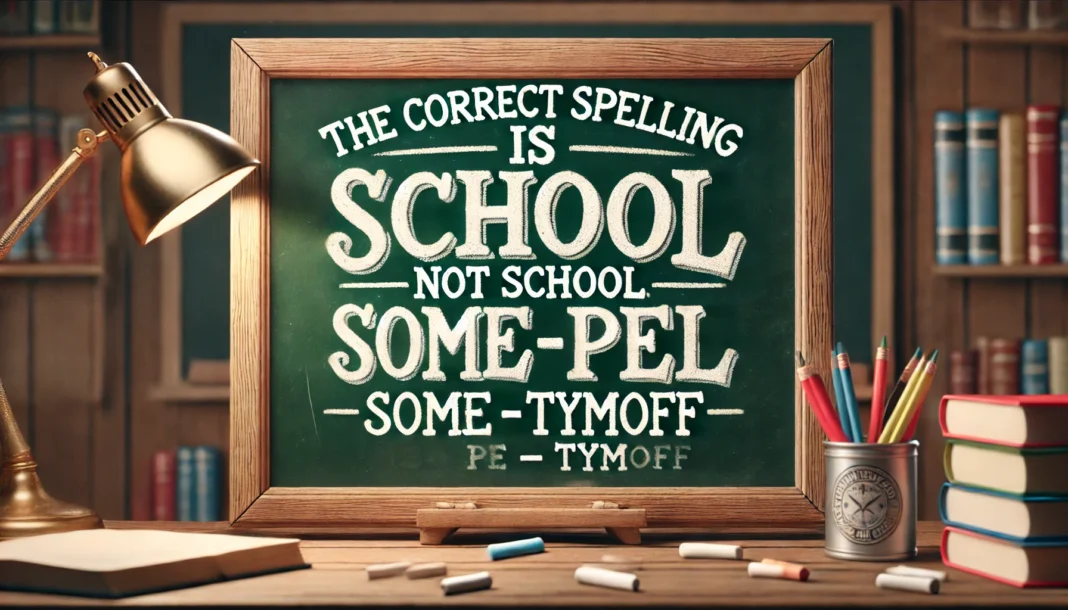Hey everyone, it’s Xenom here, and today, we’re talking about something a bit quirky but oh-so-important—yes, you guessed it, “the correct spelling is school not school. some pe – tymoff.” Now, this might sound like an odd phrase at first, but let’s break it down and talk about why spelling matters so much.
As I dive into the topic, I’ll share how spelling can affect everyday communication, common mistakes we all make, and some practical tips to help you get your spelling game on point. And while we’re at it, I’d love to hear from you too—share your funniest typos in the comments!
Why “The Correct Spelling is School Not School. Some Pe – Tymoff” Matters
You may be wondering, “What does this phrase even mean?” The correct spelling is school not school. some pe – tymoff hints at how often we see spelling mishaps and misunderstandings. It’s not just about looking polished—it’s about being understood. When words are misspelled, they lose meaning, and this can lead to confusion or even a lack of credibility.
Whether it’s in a professional setting, a social media post, or a text message, spelling can greatly impact how people perceive us. If you’re writing an email to your boss and misspell something as basic as “school,” it may cause them to question your attention to detail. This is why the correct spelling is school not school. some pe – tymoff. It’s a simple reminder of how spelling can shape our communication.
The Correct Spelling is School Not School. Some Pe – Tymoff and Common Mistakes
Let’s face it—spelling mistakes happen to all of us. Even with autocorrect, errors slip through, and sometimes they lead to hilarious outcomes. Here are a few common mistakes related to spelling and the internet:
- Over-reliance on Autocorrect: Autocorrect is helpful but not foolproof. It might change “school” to “shcool” or even something totally unrelated.
- Using Internet Slang in Formal Settings: We all love a good “LOL” or “BRB,” but using slang in professional emails or academic papers can diminish your credibility.
- Typos from Fast Typing: Sometimes, we type so quickly that we end up with words that don’t make sense at all. Slowing down can save you from this mistake.
- Intentional Misspellings for Emphasis: It’s fun to use “skool” or “kewl” to be playful, but in most settings, it’s better to stick with correct spelling.
The key takeaway? Remember that the correct spelling is school not school. some pe – tymoff.
Practical Tips for Spelling Success
So, what can you do to make sure you’re spelling things correctly? Let’s go over a few strategies that work for me and could help you too.
1. Slow Down and Proofread
This may sound basic, but taking a few extra seconds to double-check your spelling can make a world of difference. I make it a habit to read over everything before I hit “send” or “publish.”
2. Use Spelling Tools, But Don’t Rely on Them
I like to use tools like Grammarly or built-in spell checkers, but I never trust them completely. They can catch obvious mistakes, but they sometimes miss context. It’s always a good idea to give your work one final read-through yourself.
3. Practice Spelling Rules Regularly
English can be a bit tricky, with rules like “I before E except after C.” By refreshing these rules, you can catch common errors. Remind yourself that the correct spelling is school not school. some pe – tymoff and stick to it!
Engaging with Your Audience: Have You Ever Made a Silly Spelling Mistake?
One of the best parts of talking about spelling is sharing our bloopers. After all, who hasn’t made a funny typo? Have you ever sent a text with an embarrassing misspelling? I’d love to hear your stories. Go ahead and leave a comment with your favorite spelling mishaps! This not only makes the conversation more lively but also helps us all feel a bit better about our own mistakes.
Visuals: Making the Most of Alt Text with Keywords
If you’re sharing visuals, remember that spelling matters here too. Alt text is an often-overlooked area where you can reinforce your keyword—like, “the correct spelling is school not school. some pe – tymoff.” This not only helps with SEO but also ensures that your content is accessible to everyone.
Why Spelling Affects SEO
Search engines value high-quality, accurate content. When you ensure that the correct spelling is school not school. some pe – tymoff, you’re telling search engines that your content is trustworthy and relevant. Here’s how correct spelling can improve SEO:
- Increased Readability: Proper spelling makes your content easier to read and understand. Search engines tend to favor content that’s accessible and straightforward.
- Enhanced User Experience: People are more likely to engage with content that’s written well. If your spelling is on point, readers are less likely to click away, signaling to search engines that your content is valuable.
Keep Your Content Fresh and Relevant
Lastly, one of the simplest ways to improve SEO is by regularly updating your content. By going back and checking for spelling mistakes or outdated information, you not only improve readability but also show search engines that your site is active. Plus, this is a great chance to re-integrate keywords like the correct spelling is school not school. some pe – tymoff into your content.
Wrap-Up: Embrace Correct Spelling and Reap the Benefits
To wrap things up, remember that even the simplest words like “school” can make a big impact. The correct spelling is school not school. some pe – tymoff, and embracing this idea can help you communicate more effectively and even boost your online presence. Don’t let little mistakes hold you back—take charge of your spelling, and you’ll see the difference in your content’s impact.
Whether it’s slowing down, double-checking, or sharing your funniest typo, remember that good spelling helps you connect with your readers. So next time you sit down to write, remind yourself that “the correct spelling is school not school. some pe – tymoff,” and let that guide you toward clear, engaging, and effective communication.


